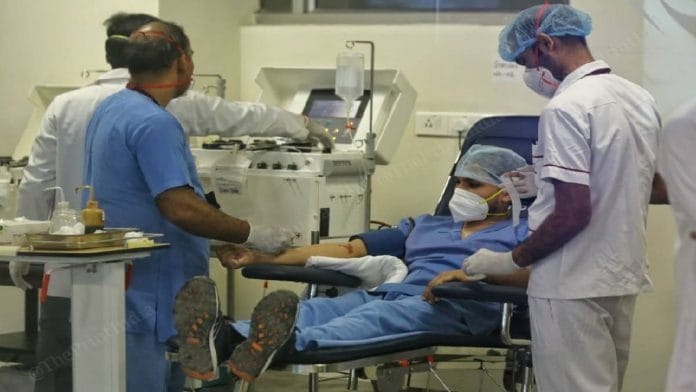New Delhi: The Indian Council of Medical Research (ICMR) is developing horse sera containing antibodies against Covid-19 as a potential alternative to plasma therapy after a study showed that the latter does not prevent deaths in moderate and severe Covid-19 patients, India’s apex medical research body said Tuesday.
“The ICMR study (on plasma therapy) was conducted on over 464 patients across 39 hostpitals, with over 350 doctors participating. The study clearly demonstrated no benefit in mortality in moderate to severe cases of Covid-19. It also did not arrest the progression of Covid-19 from moderate to severe,” ICMR Director General Balram Bhargava said at a press briefing.
However, the ICMR has taken cue from the research to develop horse sera containing antibodies against the virus, in collaboration with the Hyderabad-based firm Biological E.
The principle behind using horse sera is similar to that of plasma therapy, that is, to artificially introduce antibodies against a virus when the body is unable to produce a robust immune response on its own.
However, plasma recovered from patients experiencing Covid-19 has varying profile of antibodies, efficacy and concentrations, which makes it unreliable as a clinical tool for patient management, according to the ICMR.
The standardisation of antibody-rich plasma can be achieved using animals, the ICMR states.
The ICMR had tweeted last week that “such measures have previously been used in medical science to control many viral and bacterial infections such as Rabies, Hepatitis B, Vaccinia virus, Tetanus, Botulism and Diphtheria”.
(4/4) Standardization achievable through equine sera based treatment modality thus stands out as yet another remarkable public health initiative supported by ICMR in the time of COVID 19.
— ICMR (@ICMRDELHI) October 1, 2020
“We have completed some animal trials with the horse sera, and we have just got clearance for a clinical trial,” Bhargava said.
Also Read: Convalescent plasma therapy holds promise, but here’s why scientists are still studying it
New Covid-19 protocol from AYUSH Ministry
Also present at the briefing, AYUSH Secretary Rajesh Kotecha spoke at length about new protocols — released earlier Tuesday — regarding the use of ayurveda and yoga for Covid-19 prevention, as well as among patients with mild or no symptoms.
Kotecha, however, cautioned that these protocols are to be followed in addition to the prevention guidelines issued by the Union Health Ministry. Following the ayurveda-yoga protocol should not mean that people stop wearing masks or stop maintaining physical distancing and hand hygiene, he said.
Kerala witnessing highest increase in cases, but low CFR
Kerala is witnessing the highest increase in Covid-19 cases, Health Secretary Rajesh Bhushan said at the briefing, adding that active cases have gone up by nearly four times over the past one month.
The surge in cases, he said, is linked to Onam, which was celebrated in the state between 22 August and 2 September.
He quoted data to say that, in the week starting September 8, active cases in the state were at 22,133. As of Tuesday, Kerala had 84,958 active Covid-19 cases, the third highest in the country, he said. However, the case fatality rate — the share of Covid-19 patients dying — for Kerala is less than 1, Bhushan added.
According to the Union health ministry, Maharashtra, Karnataka and Kerala account for 50 per cent of India’s active cases. Bhushan said 48 per cent of the deaths in India were reported from 25 districts in eight states — 15 of these districts in Maharashtra alone.
The other seven states are Karnataka, Tamil Nadu, West Bengal, Gujarat, Punjab, Uttar Pradesh and Andhra Pradesh.
“The health ministry has met with the officials of these districts and made strategies to control the number of deaths. Our aim is to bring the overall Covid-19 case fatality rate of India to 1 per cent,” said Bhushan. At present, India’s overall CFR is 1.5 per cent.
Also Read: Plasma therapy — 11 trials underway, many Covid ‘cure’ stories but some doubts linger






